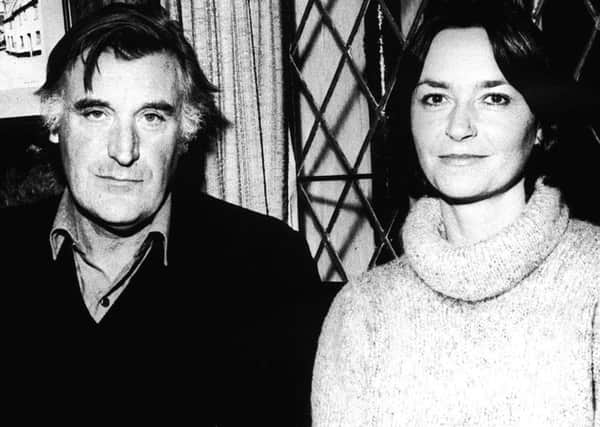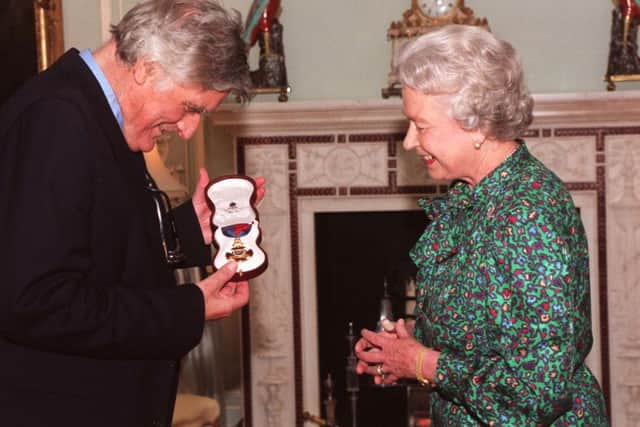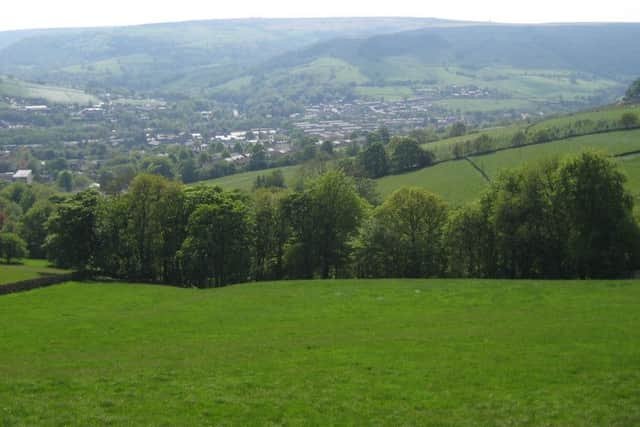Ted Hughes: chapter and verse on a giant of poetry


Ted Hughes wasn’t just a towering literary figure he was also a hugely charismatic man. Those who knew him talk about Hughes’s aura and his innate ability to make you feel as though you were the only person in the room if you were having a conversation.
He had a striking physical presence, too. Philip Larkin called him “The Incredible Hulk” and described him as looking “like a Christmas present from Easter Island.”
Advertisement
Hide AdAdvertisement
Hide AdIt’s 18 years since Hughes’s untimely death but during that time his writing has, if anything, garnered even greater praise. In 2009 the Ted Hughes Award for new work in poetry was set up and the following year The Ted Hughes Society was founded. Then in 2011 a memorial to him was unveiled in Westminster Abbey’s Poets’ Corner featuring a stone bearing his name and lines of his poetry, which was placed next to that of his mentor, T S Eliot.


Hughes spent most of his life in Devon and has become synonymous with its wild moors. But the poet was born in West Yorkshire and his formative years were spent exploring the Pennine hills surrounding Mytholmroyd and later the once-industrial landscape near Mexborough, in South Yorkshire.
It’s perhaps fitting, then, that the new Ted Hughes Network is being housed in the county where Hughes grew up. It’s being launched at the University of Huddersfield with a free public event this evening featuring several guest poets including Christopher Reid, who worked closely with Hughes during the latter part of his life.
The network’s director is Dr Steve Ely, a lecturer in Creative Writing at the University and chairman of the Ted Hughes Project (South Yorkshire). “We realised that Huddersfield was pretty much equidistant between Hughes’s old stomping grounds in Mytholmroyd in the Upper Calder Valley and Mexborough, so it seemed an ideal place to become a centre for all things ‘Ted Hughes,’” he says.
Advertisement
Hide AdAdvertisement
Hide Ad“We want to develop Huddersfield as a centre of research excellence and we also want to support the various Ted Hughes groups there are now.”


The new centre will work closely with a number of organisations including The Ted Hughes Society, The Elmet Trust and the Ted Hughes Project. It also has plans for a conference exploring the life and work of the poet next year and hopes to help create a Ted Hughes literary and heritage trail in Yorkshire.
It’s a county that Ely says played a crucial role in shaping Hughes’s poetic vision. “He was formed as a poet very early on. He was five or six when he first went roaming the hills near his home in Mytholmroyd with his brother and it’s hard to overstate how significant this period was.
“Yorkshire is important to Hughes because it formed him. It’s not clear that he would have been the same type of poet, or perhaps even been a poet at all, if it had not been for his Yorkshire experiences.”
Advertisement
Hide AdAdvertisement
Hide AdHughes certainly hit the ground running and was instantly recognised as a prodigious talent from the moment Hawk in the Rain was published in 1957. What made his success even more impressive was the fact he was swimming against the tide and writing about nature at a time when it had fallen out of fashion – with the Beat writers and their snappy, vernacular style all the rage.


Despite Hughes’s popularity, his reputation suffered in the wake of his first wife Sylvia Plath’s suicide in 1963, and in the decades that followed there was a backlash against him, especially in the United States, where Plath was lionised as a feminist icon.
But those who knew him talk of a warm and tender man. Christopher Reid was his editor at Faber and Faber and he worked closely with him on Tales of Ovid and the bestselling Birthday Letters.
He got to know Hughes during the last decade of his life. “I didn’t meet him until I was working at Faber and by chance he came into the office in 1991. He was completely wonderful to work with and he was one of those authors who liked you to talk about their work in as critical a way as possible,” says Reid.
Advertisement
Hide AdAdvertisement
Hide Ad“He was a very straightforward man. He put up barriers sometimes because he probably felt he had to, but he was someone who gave him himself totally in conversation to whoever he was talking to, so he was very approachable in that sense.”


Reid, who also edited the Letters of Ted Hughes (2007), says he helped Hughes fine tune some of his books. “My job was to look through his work and try and find flaws, not that there were many, and I would send him notes and ask questions and he would reply.”
Wasn’t this a bit daunting, given Hughes’s literary standing? “It wasn’t, actually, because he invited that kind of thing. Plus I had a certain amount of chutzpah myself which helped. But he was happy to engage in any way over this work.”
Reid liaised with Hughes over Birthday Letters which proved, sadly, to be his literary swansong. The collection of poems, released just months before Hughes’s death in 1998, was his most explicit response to Plath’s death and his subsequent anguish.
Advertisement
Hide AdAdvertisement
Hide Ad“It was very exciting as an editor to be involved in that because he had a sudden resurgence of creative activity during that period. I was lucky enough to be closely involved during this great rejuvenation.”
Much emphasis has been placed on Hughes’s childhood growing up in Yorkshire and Reid agrees. “I think his brother Gerald played an important part in his deep fascination with the natural world. He took young Ted out hunting and foraging and on wildlife watching expeditions and that stamped Ted Hughes forever.”
Images of nature abound in his books. “One of my personal favourites is River which is a wonderful evocation of what happens when you go fishing, and a visionary book at the same time.”
The scope of his writing marked him out from his peers. “His work is so varied and wide in its reach, he opened up a way of thinking about nature and human nature at the same time that nobody else had really done. He was a great innovator as a poet and that’s of lasting value.”
Advertisement
Hide AdAdvertisement
Hide AdHughes was also generous with his time, offering advice and encouragement to young poets like Simon Armitage. While his friend, the late and much lamented Seamus Heaney, described him as “a visionary English poet”.
Reid believes the continued fascination both with the man and his work, suggests Hughes will remain one of our greatest ever poets.
“I think he’s going to be everlasting. Different ages will see him in a slightly way, but at this particular moment of crisis in the environment and the amount of damage mankind does to it Hughes’s understanding of that is just one thing that will keep him in the public eye.
“His environmentalism was very serious and active. He was concerned about the state of our rivers and the way they were being polluted.”
Advertisement
Hide AdAdvertisement
Hide AdBut above all he was a colossal literary figure. “He was a brilliant observer of the world and was able to capture what he observed in words, he’s Shakespearian in that respect.
“He was a visionary and like William Blake I think he’ll be remembered as such.”
The Ted Hughes Network launch, which is open to the public, takes place at the University of Huddersfield’s Heritage Quay archives centre, today at 5.30pm.
Ted Hughes: A poet’s life
Ted Hughes was born at his family’s house in Aspinall Street, Mytholmroyd, West Yorkshire, in August 1930.
Advertisement
Hide AdAdvertisement
Hide AdHe studied at Cambridge University and in 1956 he met and married the American poet Sylvia Plath.
His first volume of poems, Hawk in the Rain, was published in 1957.
In 1984 Hughes was appointed Poet Laureate, taking over from John Betjeman.
As well as being a poet, he wrote extensively for children, including the story The Iron Man.
He also wrote stories and plays and translated the work of, among others, Ovid, Aeschylus and Euripides.
He died in October 1998.